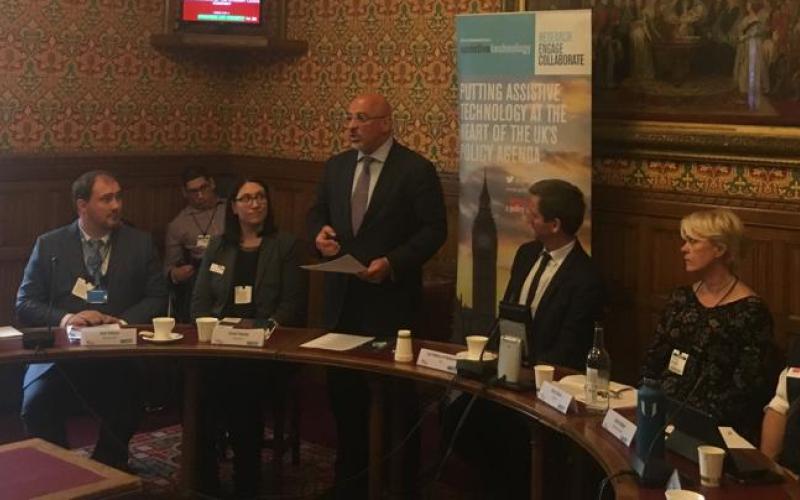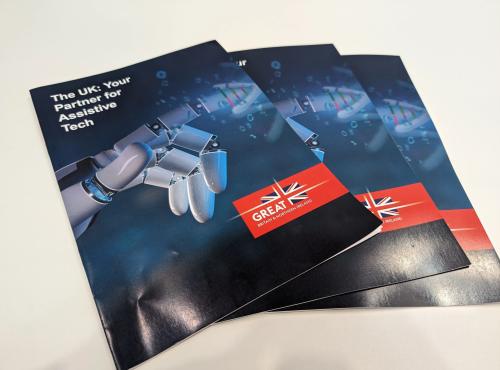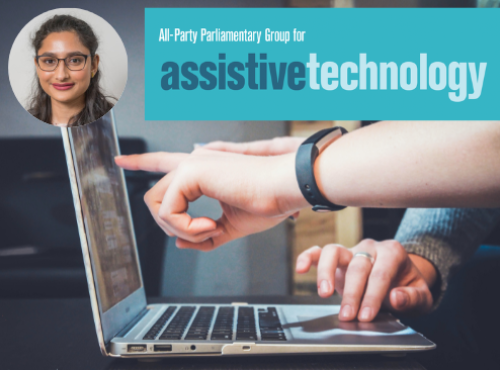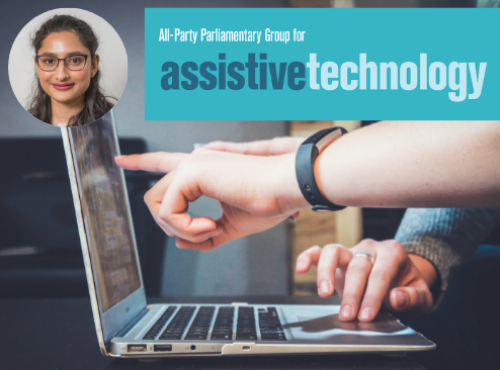Minister addresses EdTech Symposium
The Minister for Children and Families Nadhim Zahawi MP has delivered the keynote address at a symposium to mark the publication of the Government's new EdTech strategy hosted by APPG for Assistive Technology. The meeting heard views from across the special educational needs sector on how assistive technology might be better harnessed by schools to help disabled learners realise their full potential.
The strategy provides a blueprint for the action on technology across the English education system but has received a particularly warm reception from the special educational needs community for its commitment to using technology to level the playing field for disabled children.
The Minister used his speech to announce the appointment of new expert group on assistive technology to advise the government's next steps to overcome barriers to effective assistive technology use.
He told the meeting:
When implemented well, assistive technologies can be truly transformational. They can support students with complex learning, physical and cognitive difficulties to navigate learning in ways that would otherwise seem impossible. Such technologies enable students to communicate, to be independent, to have agency, to learn - Nadhim Zahawi MP, Minister for Children and Families
The centre piece of the day was a panel discussion chaired by Lord Holmes, who was joined by the following expert speakers:
- Anna Reeves, CEO, Ace Centre
- Neill Oldham, Headteacher, Highfurlong School
- Adam Gordon, SEND and Inclusion Manager, London Grid for Learning
- Dr Lisa Cameron MP, Member for East Kilbride, Strathaven and Lesmahagow
Unlocking potential
Lord Holmes set the tone for the discussion in his opening remarks by stating that "EdTech has huge potential for everybody but particularly for disabled people."
Dr Lisa Cameron MP highlighted the great strides that technology has taken in recent years in opening up new pathways through education and employment for disabled people but noted the importance of having the necessary support in place to help users take advantage of the new opportunities. She said:
We must ensure that everyone who needs technology has that technology available and access to the specialists who can help them to train on the technology that will make such a difference in their lives and level of independence and inclusion [they can achieve] - Dr Lisa Cameron MP
Neill Oldham said that technology gives pupils the opportunity to experience a degree of independence and express their true identity. Technology is often instrumental in to unlocking pupils' educational potential, helping them access mainstream qualifications and decide their own futures.
Learning from experience
Anna Reeves argued that the UK has one of the world's most leading assistive technology sectors and that government had played an important role in ensuring effective provision for children in the past. However, the some of the programmes that had been so successful in improving access to assistive technology have been discontinued without any alternative services being offered in their place. Anna said that the EdTech strategy represents an opportunity for the country to learn from mistakes and devlope programmes for the longterm.
The hesitancy of many teachers to work with assistive technology was a recurring theme in the discussion. Adam Gordon said that teachers also need support to use assistive technology in the classroom. It is vital for specialists to listen to teachers in order to properly understand their needs. Teachers often do not know about the inclusive features of many mainstream products. He said:
Schools are often unaware of the accessibility and assistive features in technologies that they already have at their disposal
Anna Reeves explained that much assistive technology in schools is lying dormant unused in cupboards because they do not retain collective knowledge and expertise about how to use assistive devices.
Neill Oldham said that this ambivalence extends far beyond the teaching profession to the NHS, housing associations providers and other organisations that his school's pupils come into contact with. Failing to support children to use their assistive technology outside can have a debilitating impact on their abilities to operate independently and express themselves, causing regression even among the most proficient users.
It was also highlighted that local authorities are currently severely under resourced. The lack of funds has led councils to axe specialist assistive technology advisor posts and close down services. This may have compounded a tendency for some schools to make ill-informed technology purchases, resulting in equipment falling into disuse and disincentivising future acquisitions.
Improving access to AT in the classroom and beyond
The meeting heard about a range of measures that could make good practice in assistive technology provision for children with special educational needs more widespread. The panel stressed the importance of filling gaps in services through more joined up thinking, especially at the local and regional level. This could be in the form of more local authority advisors or service hubs to bolster support networks.
There also need to be more opportunities to increase basic levels of awareness of assistive technology in schools and early years settings throughout better sign posting to sources of information and advice, possibly delivered via a dedicated national website.
Assistive technology should be included in the early career framework for new teachers and continuing professional development courses should be provided to keep professionals up to speed on key topics such as the assistive technology assessment process, feature matching and pupil outcomes tracking and measurement. Bulk buying schemes can significantly reduce the cost of technology.
However, improving provision within schools is not enough. The rest of community must be engaged in order to smoothen transitions. As the panel unanimously concluded, getting assistive technology right is everyone's responsibility.



